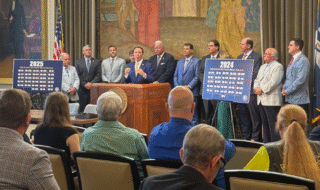August 10, 2015
From the 2020 Special Session/2019 Regular Session
Protected Small Business from COVID-19 Lawsuits
A bill passed in the August 2020 Special Legislative session to protect business owners from frivolous lawsuits related to COVID-19. Businesses are immune from civil liability for personal injury or death resulting from exposure to COVID-19, if the business substantially complies with controlling health standards. NFIB worked with the business community to advocate for these protections for businesses that are complying with CDC and local health guidelines.
Spared Small Business from Paid Leave Measure
The 2019 Legislature introduced a bill to mandate paid leave on any company with 25 or more employees. NFIB, working with the business community, exempted businesses with 50 or fewer employees from having to provide paid leave to their workers. Also exempted were temporary and seasonal workers.
Many Small Businesses Exempt from Minimum Wage Increase
The 2019 legislature passed AB 456 that will increase the minimum wage starting July 1, 2020 to $9, or $8 if you provide health insurance. There are some business lobbyists who may sue over the bill, as they don’t think the legislature has the authority to raise minimum wage since it’s in our constitution. NFIB is following that discussion and will evaluate joining such a lawsuit if one is filed.
From the 2017 session
Won Regulatory Reform Victory
Signed into law by Governor Sandoval, Senate Bill 160 now requires state agencies to be more forthcoming with new regulations by posting a draft, or any revisions of a regulation online, three working days before a regulatory hearing. NFIB worked with the bill’s sponsor before the session on crafting that language needed to help small businesses receive more notice about regulations that impact them.
Made Permanent Business Resource Centers
Also earning the governor’s signature was Assembly Bill 94, which makes the NV Grow Program permanent and provides funding to the Small Business Development Centers in Clark and Washoe county. The timeliness of this measure came at the right time, as the latest Optimism Index put out by NFIB shows finding qualified workers back to being a major concern of small business owners.
Enhanced Small Business Financing
Assembly Bill 436 is another law winning the governor’s nod. It requires the secretary of state, the Office of Economic Development, and the Regional Business Development Advisory Council for Clark County to provide small and disadvantaged businesses with information concerning public and private programs to obtain financing for small businesses.
Saved Construction-Defect Law
Although a victory from the previous session, Assembly Bill 462 would have rolled back the reforms that passed the last session on construction defects. NFIB, along with lobbyist from the chambers, insurance and construction, all opposed the bill. The unity within the business community was a death knell for this attempt to weaken the construction defect law.
Refined Nursing Mothers Bill
Seeing its inevitable passage and signing into law by the governor, NFIB worked with the sponsor of Assembly Bill 113 that requires employers to make reasonable accommodations to allow a nursing mother to express breast milk. This includes providing break time, be it paid or unpaid, and a private, clean room that is not a bathroom. NFIB met with Assemblywoman Ellen Spiegel, the bill’s main sponsor, and explained the burden this would have on small businesses with limited space. She agreed to amend the bill to apply to employers with 50 more employees, which is consistent with federal law, and to allow some flexibility related to the private space.
Adjusted Restroom Legislation
Assembly Bill 241 now requires local governments to include in their building codes a rule that buildings that contain a public restroom and is constructed after October 1, 2017, be equipped with baby changing tables in the men’s and women’s restrooms. NFIB opposed the original bill that was going to require all existing businesses with public bathrooms to add changing stations. After meeting with the business community, the bill’s sponsors, Assemblyman Justin Watkins and Speaker Jason Frierson, agreed to amend it to apply only to future construction.
Modified Equal Pay Survey
Assembly Bill 423 and Senate Bill 343 originally called for mandatory businesses participation in a survey on equal pay. After meeting with NFIB, the measures’ key sponsors, Assemblywomen Brittney Miller and Maggie Carlton and Senators Patricia Farley and Becky Harris agreed to make the survey voluntary. The survey will be conducted by the secretary of state.
Altered Pregnancy Accommodation Proposal
Senate Bill 253 establishes the Nevada Pregnant Workers’ Fairness Act and requires employers with 15 or more employees to provide reasonable accommodations to female employees and applicants who are pregnant. NFIB worked with Sen. Nicole Cannizzaro, the bill’s lead sponsor, to limit the burden to employers, including reducing possible violations to ensure that employers would not be subject to more lawsuits.
Defeated Minimum-Wage Bill
Thanks to the strong lobbying efforts from NFIB members, the governor vetoed Senate Bill 106, which would have raised the minimum wage by 75 cents a year until the hourly pay reached $12. The minimum wage is an entry level wage earned mostly by teens and young adults
Stopped Paid Leave Measure
Also vetoed was Senate Bill 196, which would have required that any business with 25 or more employees give workers at least 24 hours of paid leave a year. The good news is that the vast majority of businesses already offer paid or unpaid time off, and for any reason the employee chooses: sickness, care for a family member, parental duties, personal or family member victim of domestic violence, etc. (see infographic here). Also, the federal Family and Medical Leave Act “provides certain employees with up to 12 weeks of unpaid, job-protected leave per year. It also requires that their group health benefits be maintained during the leave. The rigid nature of state mandates only interferes with the agreements employees and employers have come to that is beneficial for both.
Killed Health Insurance Mandate
Assembly Bill 175 was also vetoed. It would have required employers who pay minimum wage to offer health insurance plans roughly equivalent to a “bronze” level plan under the Affordable Care Act.
For 30 consecutive years, the cost of health care has been a small-business owner’s No. 1 worry—out of 75 concerns measured by NFIB. The lion’s share of the credit for the problem goes to Washington D.C., but states do their part to exacerbate the crisis by passing more and more mandates on insurers who pass the cost along to small businesses in the former of higher premiums—at least to those who can still afford to provide their employees with health care. NFIB/Nevada will continue its battle to make health care affordable to a broader base of consumers by opposing state mandates that only drives insurance farther out of reach for Main Street enterprises.
Halted Lawsuit-Boosting Equal Pay Bill
Small business is also grateful for Governor Sandoval’s veto of Senate Bill 397, which would have imposed new penalties for “equal pay” complaints and exposed employers to more lawsuits.
NFIB strongly supports equal employment opportunity and appropriate enforcement of the federal Equal Pay Act, which protects all employees, and Title VII of the Civil Rights Act of 1964.
Federal and state law already prohibit gender discrimination, including workplace compensation and benefits, but so-called “equal pay” legislation proposed in states are typically little more than increased penalties for behavior that is already against the law. While increasing penalties may enrich a few attorneys who file questionable lawsuits against numerous small-business owners who don’t have the resources to fight frivolous cases in court, they will do little or nothing to improve wages for women.
Beat Back Triple-Damages Bill
NFIB worked to kill many bills before they could get to the governor’s desk, including Assembly Bill 211, which would have allowed an employee to be paid triple damages if they were successful in winning a case against their employer related to wage violations. NFIB also helped kill Assembly Bill 178, which would have made small-business employers more vulnerable to employment lawsuits.
From the 2015 session
- an increase on the mining tax
- a 4.5 percent tax on any business with an income over $500,000
- a sales and property tax increase in Washoe County
- an entertainment and admissions tax
- a tax on snack foods
NFIB lobbied for the successful passage of Senate Bill 251 out of that chamber. As of this writing it is also expected to pass the House, but even if it should falter, Gov. Brian Sandoval has promised to implement the important parts of it by executive order. The bill would create a Sunset Commission to evaluate government and services with an eye toward opportunities to eliminate redundant rules and agencies and consolidate the tasks of others. The Commission is one of the top recommendations of the Spending and Government Efficiency Commission (SAGE).
Killed three bills aimed at punishing independent contractors
NFIB made defeat of Senate Bills 147, 148, and 242 its top priority of the 2011 session. All three would have made it effectively illegal to be self-employed by substantially narrowing the definition of who an independent contractor could be and what an independent contractor could do. During this recession many people are frustrated at not finding a job, so some are starting their own small business, but these bills would have made that virtually impossible. Additionally, the measures aimed to limit a company’s ability to use independent contractors at a time when many businesses can not afford to hire full-time staff and rely on contractors for needed extra help.
Blocked attempts to increase health-insurance premiums
Every time lawmakers come up with a new medical procedure to saddle health insurers before they allow them to sell policies, the immediate effect is to drive up insurance premiums and push medical coverage farther and farther out of the financial reach of small business owners. Assembly Bill 89, adding acupuncture treatment, was another such mandate that NFIB worked to defeat, and succeeded. NFIB also continued its push to allow insurers the ability to tailor health-care plans to fit their customers’ needs rather than the edicts of state government. This is the only way to broaden coverage to the uninsured.
Defeated a proposed gas tax increase
NFIB opposed a proposal to raise the state’s tax on a gallon of gas. Supporters floated a trial balloon for boosting the gas tax, Assembly Bill 507, by two cents to a total of 19.65 cents. NFIB help popped that balloon.
Killed measures to apply the state sales tax to bottled water and snack foods
Assembly Bill 218 would have applied the state sales tax to include bottled water, which is currently exempt as it considered a food item. Assembly Bill 399 would add a five-cent tax onto snack foods. NFIB helped persuade legislators that taxing snack foods, often called sin taxes, would not bring enough revenue to recoup the cost to the state of keeping records on this income, and that taxing bottled water was an unfair levy on people who need it as much as food.
From the 2009 session
Defeated healthcare mandates for eating disorders and acupuncture
NFIB/Nevada succeeded in stopping two healthcare mandates on eating disorders and acupuncture from passage. Mandates, which are orders by state government to add more and more conditions to basic healthcare plans, drive up the cost of medical coverage and put farther out of affordability range for small business owners.
Stopped anti-employer workers’ compensation bills
Working with other business association, NFIB/Nevada was successful in defeating a number of bills that would have driven up the cost of workers’ compensation rates. One bill would have required an employer, not an employee, to bear the burden of proof in showing an injury occurred at work. Another measure would have created a new cause-of-action lawsuit. Senate Bill 195, a compromise measure, did eventually pass and was signed into law by Gov. Jim Gibbons. Although it includes some provisions NFIB/Nevada testified against, including one that prevents injury awards from reflecting the most recent cost saving medical advances and treatments, SB 195 was far better than what was being pushed by the labor lobby and should not result in significant changes in how the workers’ compensation system is administered in Nevada.
NFIB is a member-driven organization advocating on behalf of small and independent businesses nationwide.
Related Articles














